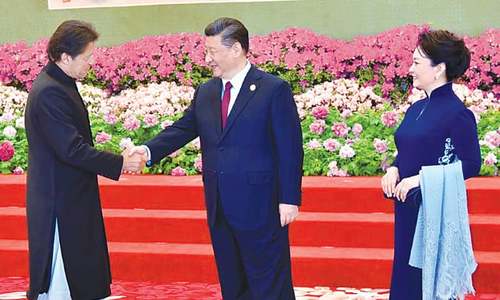PRIME MINISTER Imran Khan’s consistent efforts to highlight climate change at national and international forums show that he realises the scope of the grave environmental dangers that Pakistan faces.
In his speech to the UN General Assembly in September, climate change topped the list of our four biggest challenges. More recently, Mr Khan, while speaking at the inaugural ceremony of the seventh IUCN Asia Regional Conservation Forum, pointed out the close link between climate-related challenges and socioeconomic goals. He stressed the need to pursue development policies geared towards environmental conservation, and said that mitigating the impact of climate change was crucial to achieving poverty- and development-related SDGs.
Mr Khan also referred — once again — to the billion trees that the PTI-led provincial government in KP claims it planted between 2014 and 2018.
There is no disagreement that the initiative was commendable, but it must be asked if the endeavour was enough to counter the overall effect of rapid deforestation, which at between 0.2pc and 0.5pc is said to be the highest in the world.
So, for all his earnestness to bring a subject close to his heart into the national discourse, how much has actually been achieved on the ground since the PTI came to power?
Unfortunately, the plans, though ambitious, are hardly well-thought-out. For instance, while a mass transit system is expected to reduce traffic congestion, and thus carbon emissions, the as yet incomplete Rs70bn BRT project in Peshawar has been roundly condemned for its poor execution.
Similarly, the cabinet’s nod to another ambitious plan to convert at least 30pc of four- and three-wheelers into electric vehicles and 3,000 defunct CNG stations into charging stations — ostensibly to reduce air pollution and the fuel bill — is impractical in these days of a depressed economy.
How would these projects change the life of the millions of farmers, fishermen and villagers who bear the brunt of the devastation wrought by climate change when they lose their homes and livelihoods to extreme weather events?
The truth is that unless greater awareness is created among the majority of the people, even measures such as the ban on the manufacturing and sale of single-use plastic will receive a poor response.
Remedial steps by the government are required, and perhaps updating the country’s National Climate Change Policy to include comprehensive short- and long-term targets, especially with regard to deforestation and environmental pollution, would be a sensible place to start. Such a step would require relentless campaigning by not just the top tier of the political leadership, but all levels of government.
Keeping in mind that Pakistan is among the top 10 countries most vulnerable to climate change, the prime minister will have to put his words into action and tirelessly work on sustainable environmental and development reforms.
Published in Dawn, November 8th, 2019













































